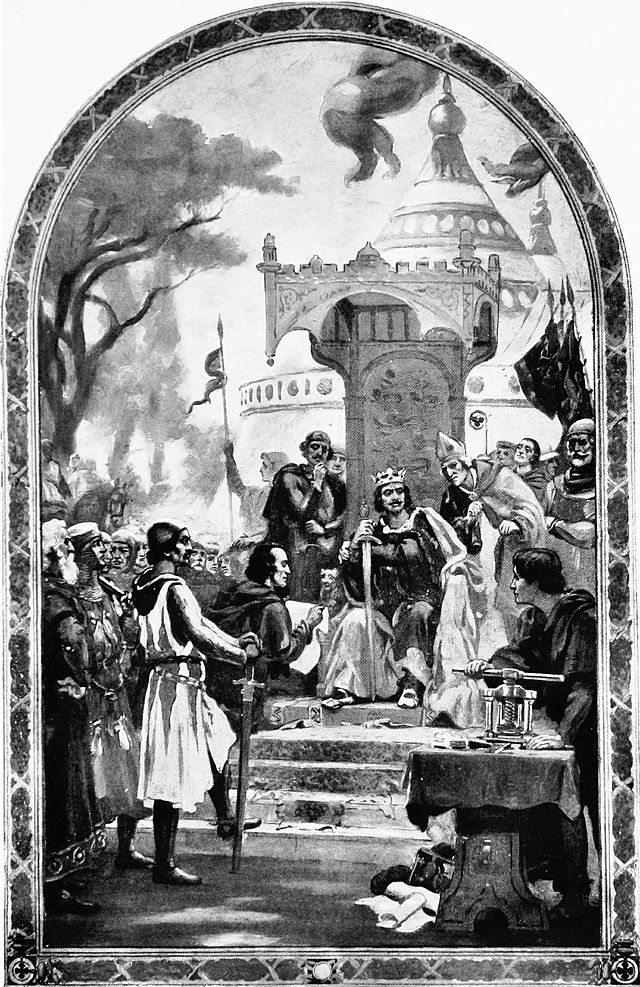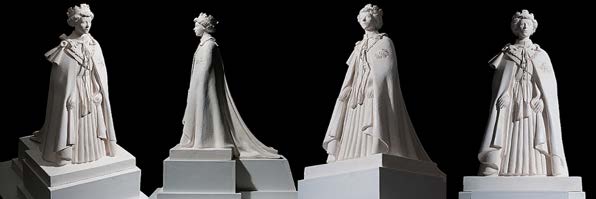Liberty Matters
A Blend of Fact and Make-believe

As David Womersley so forcefully reminds us (6 May), even a “Wrong Map” can supply comfort to its users. In the particular case of Magna Carta, there is no doubt that a great deal of what is popularly accepted about English liberties and the Anglophone love of freedom derives from just such a “Wrong Map,” from the fictions of the Ancient Constitution concocted by Edward Coke and his successors, from the 16th century onwards. The consequences of thus blending fact and fiction are with us still. As illustration, I would draw attention to two of the more delicious ironies of Magna Carta’s 800th anniversary celebrations. Magna Carta is in many ways a deeply anti-monarchical document, and yet throughout 2015, those organizing its birthday celebrations have been at pains to involve members of the British royal family. Exhibitions in Washington and London have been ceremonially opened by the children of the Queen (Prince Charles and Princess Anne), and the Queen herself serves as honorary president of the Magna Carta anniversary committee. In February 2015, she hosted a reception for lawyers and others interested in Magna Carta at Buckingham Palace.[51] The local council authorities at Runnymede have chosen to mark this anniversary year by erecting a large bronze statue of Her Majesty, in questionable taste, but nonetheless a powerful indication of the ways in which Magna Carta can both be presented as a radical riposte to monarchy and as a royal charter, itself granted by a King of England, confirming the king as ultimate source of law.[52] Who else but the King was there in 1215 to establish, according to the terms of Magna Carta c.39, whether any particular judgment was or was not “lawful”? Who more appropriate today than the Queen of England to act as figurehead for an 800 year-old constitutional settlement?

These ironies extend today across the Atlantic to the land of the free. The rejection of monarchy in the American colonies of the 1770s was accompanied by a violent revolution fought against the government of King George III at least in part in the name of Magna Carta and liberty. In North America today, organizations still exist whose purpose is not only to celebrate the English monarchy but to trace and (for a price) authenticate the family trees of those claiming descent from one or other of the 25 barons of Magna Carta.[53] Since these barons were themselves of aristocratic and in many cases ultimately of royal descent, a great deal of the thrill of becoming a modern “Dame” or “Baron” of Magna Carta is to know that, ultimately, one is descended from Charlemagne or another great king of the medieval past. Quite how this sits with the American celebration of freedom from royal tyranny remains hard to determine. Magna Carta thus serves both reactionary and radical agendas. As any student of American politics can affirm, these two impulses are notoriously hard to tell apart. Meanwhile, the distant past still exercises an attraction for those in the present looking for the roots and justifications of liberty and freedom.
As Justin Champion and David Womersley also remind us, this was an imperative felt very strongly in the 16th and 17th centuries. It was felt no less strongly, particularly at times of perceived social or political disruption, in more distant antiquity. Englishmen in the aftermath of the Norman Conquest of 1066 did their best to seek for precedents and safeguards against Norman tyranny in the freedoms of the prelapsarian Anglo-Saxon past. To support their case here, they resorted to forgery on a heroic scale, inventing laws and law codes which were then foisted upon Anglo-Saxon kings (Cnut, Edward the Confessor) as a guarantee of their authentic antiquity[54] It was precisely this desire to locate freedoms and privileges in the distant past that persuaded the barons of King John’s reign to demand that John renew the “Laws of Edward the Confessor,” even though such laws were in reality a product not of the Confessor but of the 1120s and 1130s. Nor does the story end there. The Anglo-Saxons themselves, long before 1066, had developed an idea of liberty that itself derived in part from an anachronistic reading of the Christian Bible, in part from charters granted by the earliest Anglo-Saxon kings, in many cases subsequently rewritten or improved by their beneficiaries. The insertion into such charters, either by their original royal grantors or in the course of post-Conquest forgery, of claims to “liberties” or “immunities” rendered them potentially hostile to the king’s claims to sovereignty. “Libertas” in this reading became the negation not only of slavery, in its Roman or post-Roman sense, but of whatever term, up to and including “lordship” (“dominium”) might be adopted by kings to designate their own particular brand of lordship.[55]
Such efforts were founded upon a shadowy collaboration between fact and fiction. Yet there can be little doubt that as early as the 13th century they contributed to a sense that England was a nation with a particular concern for “liberties” in the institutional and plural sense, if not as yet in the private and singular. Here indeed the defense of aristocratic or ecclesiastical “privilege” produced, almost as an unintended consequence, a consensus that property-holding served as a necessary prerequisite for personal liberty. Back in the 1970s, Alan Macfarlane incurred the wrath of academe for arguing that, as early as the 13th century, the English were fundamentally different from other European peoples, as their family structures, their legal tradition and their property-holding peasant class increasingly ensured them freedom from the burdens of servitude.[56] Macfarlane drew here on a tradition of legal anthropology pursued since at least the time of Sir Henry Maine.[57] The debate on serfdom has moved on a long way since then.[58] Nonetheless, and here returning to the world of Magna Carta, there seems little doubt that the assizes of the 12th-century extended a degree of security of tenure in real property transactions, both for land and for merchandise, far beyond the barons and knights for whom these assizes were chiefly intended.[59]
Were we looking for explanations here, a great deal might be blamed on the laws of unintended consequences. Another explanation can be traced via the 12th-century reverence for the Anglo-Saxon past, back through the forged or improved law codes of the 12th century such as the Leges Edwardi Confessoris or the Instituta Cnuti, reinventing pre-Conquest “liberties” and “laws” with no real risk that the new Norman conquerors would be in a position to challenge what were claimed as privileges from the far-distant past. Another explanation, more traditional and yet still persuasive, would be to trace genuine evidence of the equation between law and liberty back before the Conquest of 1066, to the traditions of the Anglo-Saxons themselves, to the free peasantry of East Anglia and the Danelaw (an area of England from which came so many of the barons of 1215), to the legal tradition of Ine, Alfred, and their successors, and ultimately to the Germanic tribes of Tacitus, even perhaps to the prehistoric past.[60]
In other words, for all that the lawyers and constitutionalists might pretend otherwise, our ideas of “Liberty,” from Tacitus onwards, have been compounded from a rich and still volatile blend of fact and make-believe. It is this rich tradition, not merely an 800-year-old piece of parchment, that deserves celebration in Magna Carta’s anniversary year.
Endnotes
[52.] For a positive assessment of the Runnymede statue, see <http://www.queenjubileestatue.co.uk/>, noting that a similar statue may be commissioned for the Channel Islands. The reaction by the people of Runnymede has been less positive
[53.] See here The National Society Magna Charta Dames and Barons <http://www.magnacharta.org/>
[54.] Bruce O’Brien, God’s Peace and King’s Peace: The Laws of Edward the Confessor (Philadelphia 1999); idem, “Pre-Conquest Laws and Legislators in the Twelfth Century,” The Long Twelfth-Century View of the Anglo-Saxon Past, ed. Martin Brett and David A. Woodman (Farnham 2015).
[55.] The fundamental study here remains that by Julia Crick, “‘Pristina Libertas’: Liberty and the Anglo-Saxons Revisited,” Transactions of the Royal Historical Society, 6th ser. 14 (2004).
[56.] Alan Macfarlane, The Origins of English Individualism: The Family , Property and Social Transition (Oxford 1978).
[57.] In particular, Maine, Ancient Law: Its Connection with the Early History of Society, and its Relation to Modern Ideas (London 1861). Online version: Ancient Law, its connection with the early history of society and its relation to modern ideas, with an introduction and notes by Sir Frederick Pollock. 4th American from the 10th London edition (New York: Henry Holt and Co., 1906). </titles/2001>. For a modern study of Maine (1822-1888), see Karuna Mantena, Henry Maine and the Ends of Liberal Imperialism (Princeton 2010).
[58.] See here in particular, and in many ways from opposite perspectives, Paul Hyams, Kings, Lords and Peasants in Medieval England: The Common Law of Villeinage in the Twelfth and Thirteenth Centuries (Oxford 1980), and Mark Bailey, The Decline of Serfdom in Late Medieval England (Woodbridge 2014).
[59.] For highlights from a vast literature here, see John Hudson, The Oxford History of the Laws of England. Volume II: 871–1216 (Oxford 2012).
[60.] This was the tradition inherited by Sir Frank Stenton (1880-1967), in part from the “tribal” enquiries of Frederic Seebohm (1833-1912). See in particular Seebohm, The English Village Examined in its Relations to the Manorial and Tribal Systems (London 1983). In turn, it remains a tradition fundamental to the writing both of the Rosamond Faith, The English Peasantry and the Growth of Lordship (London 1997), and, massively influential, Patrick Wormald, The Making of English Law: King Alfred to the Twelfth Century, left uncompleted at the author's death, with only volume 1 published as Legislation and its Limit (Oxford 1999). For influences over Wormald, see in particular the collected essays of James Campbell, Essays in Anglo-Saxon History (London 1986), still the most cogent defense of English legal and social particularism.
Copyright and Fair Use Statement
“Liberty Matters” is the copyright of Liberty Fund, Inc. This material is put on line to further the educational goals of Liberty Fund, Inc. These essays and responses may be quoted and otherwise used under “fair use” provisions for educational and academic purposes. To reprint these essays in course booklets requires the prior permission of Liberty Fund, Inc. Please contact oll@libertyfund.org if you have any questions.